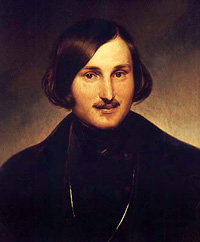Russia marks 200th anniversary of Nikolai Gogol, whom Ukraine disavows as hostile writer
Russia marks the 200th anniversary since the birthday of Nikolai Gogol, the great Russian and Ukrainian writer, on April 1. Gogol is widely recognized in Russia as a part of the nation’s endowment and must be treated so in Ukraine, where he was born. However, his works do not match the political concept of the sitting Ukrainian administration. Gogol’s novels and stories have been translated into Ukrainian and published in a text book on foreign literature in Ukraine. The Ukrainian government is ready to disavow its greatest writer for the sake of its struggle with Russia.

Vladimir Putin emphasized the importance of humanitarian cooperation between Russia and Ukraine three years ago. He said that the two countries would celebrate the 300th anniversary of the Battle of Poltava and the 200th anniversary since the birth of Nikolai Gogol.
However, Ukraine deliberately tries to do everything to ruin its relations with Russia. Russia views the Battle of Poltava as a great Russian-Ukrainian victory, whereas Ukraine believes that it marked the defeat of the union between Ukraine and Sweden.
A person known for his screen name as Andrei Okara posted an interesting message on his blog. He is said to be a Moscow-based political scientist of Ukrainian descent. His article rehabilitates the great writer in terms of his psychic state and stresses out Gogol’s Orthodox spirituality.
A text book on foreign literature for Ukraine’s secondary schools contains a selection of old-Russian folk tales. The tales are thus represented as the cultural legacy of a foreign nation, which contradicts to a text book on history, which defines old-Russian folk tales as a part of the history of Ukraine. More importantly, Gogol’s renowned story Taras Bulba appears on page 112 of the text book on foreign literature, translated from Russian into Ukrainian.
Nikolai Gogol seems to be a very uncomfortable figure for the Ukrainian administration. It is ready to disavow the great writer not to have anything in common with Russia.
Gogol’s early works, such as Evenings on a Farm Near Dikanka, were heavily influenced by his upbringing in Malorossii and identity. Yet, the writer is often called the "father of modern Russian realism.” He was one of the first writers to criticize his country's way of life. The novels Taras Bulba (1835) and Dead Souls (1842), the play The Inspector-General (1836, 1842), and the short stories Diary of a Madman, The Nose and The Overcoat (1842) are among his best known works. With their scrupulous and scathing realism, ethical criticism as well as philosophical depth, they remain some of the most important works of world literature.
On the night of February 24, 1852 , he burned some of his manuscripts, which contained most of the second part of Dead Souls. He explained this as a mistake — a practical joke played on him by the Devil. Soon thereafter he took to bed, refused all food, and died in great pain nine days later.
Gogol was buried at the Danilov Monastery, close to his fellow Slavophile Aleksey Khomyakov. In 1931, Moscow authorities decided to demolish the monastery and had his remains transferred to the Novodevichy Cemetery.
His body was discovered lying face down, which gave rise to the story that Gogol had been buried alive. A Soviet critic even cut a part of his jacket to use as a binding for his copy of Dead Souls. A piece of rock which used to stand on his grave at the Danilov was reused for the tomb of Gogol's admirer Mikhail Bulgakov.
Subscribe to Pravda.Ru Telegram channel, Facebook, RSS!





